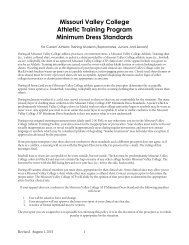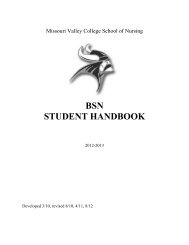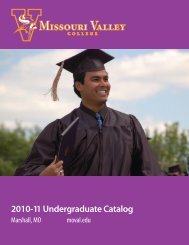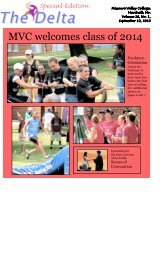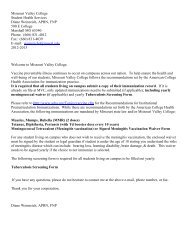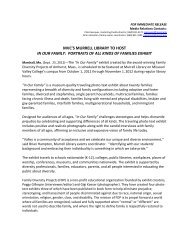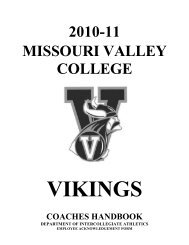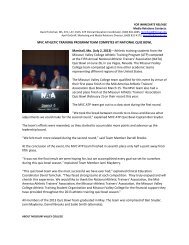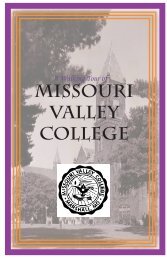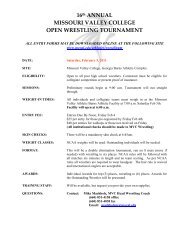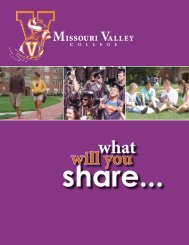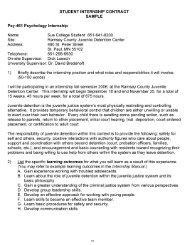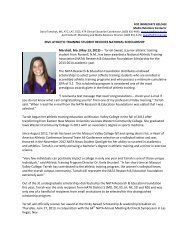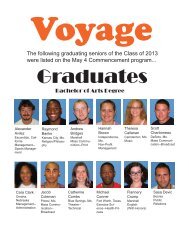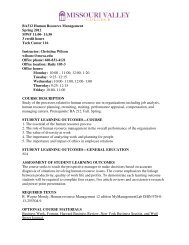April 30, 2010 - Missouri Valley College
April 30, 2010 - Missouri Valley College
April 30, 2010 - Missouri Valley College
You also want an ePaper? Increase the reach of your titles
YUMPU automatically turns print PDFs into web optimized ePapers that Google loves.
Page 12<br />
The Delta<br />
NEWS <strong>April</strong> <strong>30</strong>, <strong>2010</strong><br />
Seminars blend science, religion<br />
The information was vast from the four seminars<br />
about Science and Religion, held during the month<br />
of <strong>April</strong>.<br />
--Of 20 countries in the world, the United States<br />
ranked 19th in public acceptance of evolution.<br />
--The age of the sun is 5 billion years and the<br />
sun’s average temperature is 6,000 degrees.<br />
--Science measures the age of the universe at<br />
13.75 billion years.<br />
Physics Professor John Gault said, “I believe that<br />
science needs religion and religion can receive a<br />
strong benefit from science.”<br />
All of the speakers in the series endorsed evolution<br />
as a process in the natural world.<br />
Sarah MacDonald, assistant professor of Biology<br />
and Botany, quoted Galileo who, in 1620, said,<br />
“The Bible tells us how to go to Heaven and not<br />
how the heavens go.” Galileo got into trouble with<br />
the Church of the day for suggesting that the Earth<br />
went around the Sun and was forced to recant his<br />
message.<br />
Chemistry Professor Stephen Patton’s presenta-<br />
(Continued from the previous page)<br />
Henry earned an engineering degree and still<br />
works for National Cash Register company in<br />
Chicago. “I thought a playwright was William<br />
Shakespeare, Tennessee Williams, a dead guy.”<br />
After his first play was produced, he said he realized<br />
he was a playwright and “had arrived.”<br />
“Be whatever you want from day one and pursue<br />
it with all the passion you have,” he said. He said<br />
all people have their moments of failure. Henry<br />
said an important aspect of success is a positive<br />
attitude. He said he will sometimes say to himself,<br />
“Today is my favorite day” because it is the one<br />
he’s living in. “I try to create my own weather when<br />
it’s gloomy outside.”<br />
He asked students to think about the question,<br />
“What am I going to do with this one life that God<br />
has given me?” To which Henry offered two more<br />
questions to ponder, “What do you like most? What<br />
do you like to do?”<br />
Henry quoted radio commentator Earl<br />
Nightingale who once defined happiness as<br />
“Progressive realization of a worthy goal.”<br />
tion noted that there are 53,2<strong>30</strong>,834 known chemical<br />
substances. Patton said the two chemicals that<br />
people know most about is water and salt.<br />
He said there are many references to salt in the<br />
Bible. Too much salt is bad, too little salt is bad, but<br />
just the right amount of salt is good and ncessary,<br />
Patton said.<br />
Peter Warnock, assistant professor of<br />
Anthropology and Archeaology, said people and<br />
cultures can view Biblical description by logical or<br />
abstract thought, in figurative or literal ways.<br />
Jesus used parables for teaching, which is a form<br />
of abstract thought, Warnock said. He said the story<br />
of Jericho could be interpreted literally or figuratively,<br />
with walls coming down or people’s wills<br />
being overcome.<br />
Warnock said the story of the Great Flood can be<br />
found in Genesis as well as in writing in other<br />
ancient cultures, such as Sumerian, Hindu, and<br />
Scandinavian.<br />
The seminars by Gault, MacDonald, Patton, and<br />
Warnock drew large crowds of students.<br />
More about Institute’s business speakers provide wisdom<br />
One of Henry’s son came to MVC for a year on a<br />
baseball scholarship. He also has a son who is a<br />
filmmaker in Los Angeles.<br />
Henry said his greatest achievements are his 32year<br />
marriage to his high school sweetheart, their<br />
eight children, and four grandchildren. His wife,<br />
Dona, accompanied him to Marshall.<br />
THE LAST INSTITUTE<br />
SPEAKER<br />
Benoit Wesly, chairman,<br />
president and CEO of Xelat<br />
Group of Maastricht, the<br />
Netherlands, was the last<br />
speaker for this year’s institute.<br />
Wesly’s involvement<br />
with the institute over the<br />
years was crucial to its origin<br />
and progress.<br />
He has worked in the<br />
health care business, the<br />
music business, and the<br />
restaurant and hotel business.<br />
“Your professors and fel-<br />
Benoit Wesly concludes the conference<br />
with advice about life’s opportunities.<br />
Physics Professor John Gault was the first<br />
speaker in the seminar series this year.<br />
low students make you richer,” Wesly told the students.<br />
“They have contributed to your future wealth<br />
and future welfare.”<br />
Wesly said that the Netherlands celebrates 400<br />
years of a relationship with the United States.<br />
He talked about his Jewish family, which numbered<br />
51 prior to World War II with only three family<br />
members, including<br />
his parents, surviving the<br />
Nazis reign in Germany.<br />
He said his 3-year-old<br />
brother was one of many<br />
who died in the<br />
Auschwitz’s concentration<br />
camp.<br />
Wesly said every day is<br />
a new day and that “Life<br />
gives us the opportunity<br />
to make something better.”<br />
He said, “In what you<br />
do, always be guided in<br />
consideration of how you<br />
would like to be treated as<br />
a human being.”



